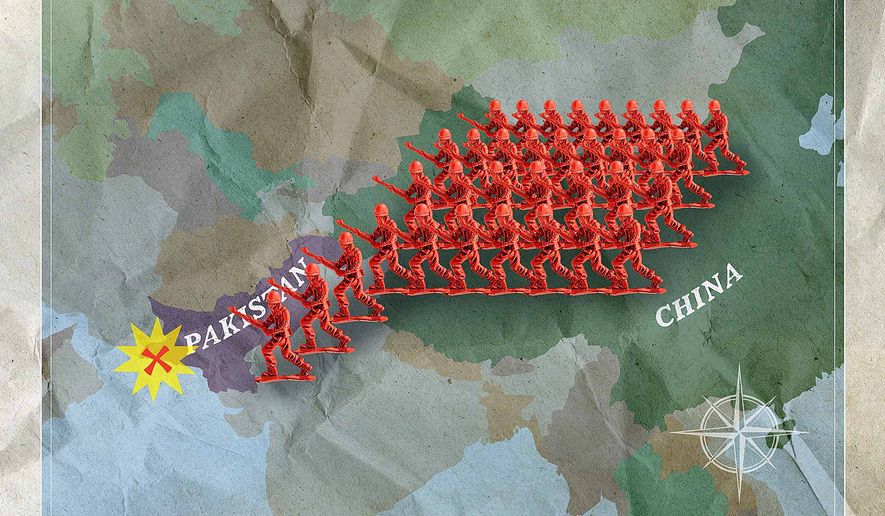OPINION:
Nuclear-armed Pakistan is not a model of stability. It just elected a new prime minister after a campaign that featured widespread violence and election day bombings. The apparent loser has alleged vote-rigging in favor of his opponent, who was supported by the omnipresent Pakistani army.
That’s one half of the context in which the International Monetary Fund (IMF) will soon consider another financial bailout for Pakistan, which has benefited from a dozen of them since the 1980s.
The other half is the fact that Pakistan’s economy is in shambles due to large-scale corruption and a growing debt crisis. The money it owes other nations and non-Pakistani entities is more than 30 percent of its GDP partly because of the extensive loans it has received from China to build parts of CPEC, the China-Pakistan Economic Corridor, by which China is building roads, power plants, railroads and military bases in Pakistan.
Pakistan needs about another $3 billion in the next few months to avoid defaulting on loans from the IMF, the World Bank and China. The IMF will almost certainly bail Pakistan out of its financial troubles again. But should it? There are two reasons that weigh heavily against such an action.
The first is Pakistan’s continuing support of a variety of terrorist networks through its infamous Inter Service Intelligence agency, ISI. Among the terrorist groups Pakistan supports are al Qadea, the Taliban (also supported by Russia and China) and Lashkar-e-Taiba, which massacred more than 160 people in Mumbai, India, in 2008. Osama bin Laden hid for years in Abbottabad, Pakistan. It’s inconceivable that ISI wasn’t responsible for his concealment.
The Trump administration has terminated military aid to Pakistan because it refuses to cease supporting terrorist networks with money, fighters and intelligence information. But there is no action we, or any other nation, can take to stop Pakistan’s religiously-based support for terrorism. Why, then, shouldn’t we block another IMF bailout?
The second reason not to bail out Pakistan is China’s growing de facto colonization of Pakistan through CPEC. According to a Wall Street Journal report, China is investing about $62 billion in Pakistan to build infrastructure projects. Three years into the program, according to that report, about half of the CPEC planned projects have begun.
China is conducting what some call “debt trap diplomacy,” through which Pakistan is becoming so indebted to China that it will be compelled to follow China’s policies in Southwest Asia and beyond. In fact, the debt trap has already been sprung with the eager assistance of the Pakistan’s government, ISI and army.
Gwadar is a large Pakistani city on the Arabian Sea. Chinese officials have demanded that much of the nearby population be moved away for security reasons and to make room for thousands of Chinese military and civilian people being brought in to construct large port facilities and eventually transform Gwadar into a Chinese naval base.
Pakistan’s government — dependent on its army for whatever level of stability it can achieve — will not suffer de facto colonization gladly. Despite Pakistan’s support of terrorism, China’s corrupting largesse will be able to satisfy the Pakistani army and ISI sufficiently to quell any thoughts of rebellion.
In June, Defense Secretary James Mattis said of China, “The Ming Dynasty appears to be their model, albeit in a more muscular manner, demanding other nations become tribute states, kowtowing to Beijing.”
Another IMF bailout for Pakistan would be a Western contribution to China’s transformation of Pakistan into a tribute state. In these circumstances, the United States — the largest contributor to IMF — needs to voice its opposition to another bailout of Pakistan and try to prevent it. We probably can’t prevent it, but we certainly need to try. We have some leverage.
According to a 2016 report by the Congressional Budget Office, U.S. obligations to the IMF were then $164 billion. But, as the CBO reported, it is very difficult to account for the actual costs we incur. Nevertheless, as the CBO wrote, because of the risk of defaulted loans U.S. contributions to IMF are at risk.
Some will argue that denying Pakistan another IMF bailout would force it to borrow more from China, accelerating its dependence on Chinese largesse and power. Unfortunately, that dependence is already established and whether IMF grants another bailout or not won’t change that.
Instead, denying another IMF bailout would make Pakistan’s subservience more obvious to the Pakistani population and government. The attendant embarrassment to Pakistan could create friction between it and China, which is sufficient reason for another IMF bailout to be blocked.
Pakistan’s immediate importance to us is the logistics route it has provided for supply our and our allies’ forces in Afghanistan. China’s power over Pakistan may cause future closures. Thus, our policy toward China has to factor in the war in Afghanistan. India, which borders both Pakistan and China, is the key.
But our policy toward China is unclear. President Trump’s accelerating tariff war won’t turn it into a fair trader, far less an ally. It would be far better for the president to speak out on the dangers of China’s de facto colonization of Pakistan and other nations.
If such action were coupled with a clear embrace of India, comprised of a new trade agreement and the beginning of a defense alliance, the president’s policy could help contain China’s ambitions.
• Jed Babbin, a deputy undersecretary of defense in the George H.W. Bush administration, is the author of “In the Words of Our Enemies.”




Please read our comment policy before commenting.